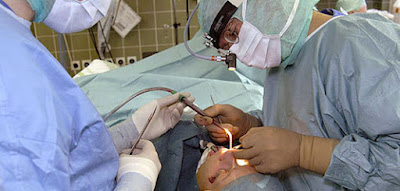At Long Last! Guidance from the GMC and RCS finally protects patients from high-risk cosmetic procedures! Or does it?
In this post, Melanie Latham (Manchester Metropolitan University) reflects on new guidance for cosmetic practitioners - does it go far enough?
New guidance for cosmetic practitioners published this week by two
important medical bodies has been desperately needed in the UK for several
years. It should go a long way to
protect patients.
The General Medical Council’s (GMC) long-awaited guidance for cosmetic
practitioners in the UK, “Guidance for
doctors who offer cosmetic interventions”, comes into force in June
2016. This is to be read alongside
today’s publication from the Royal College of Surgeons (RCS) “Professional Standards for Cosmetic Surgery”,
which concentrates on cosmetic surgery.
The new GMC guidance covers both surgical and non-surgical
procedures, so facelifts, but also Botox.
It makes recommendations to practitioners about what they should do to
practice professionally and refers to advertising; a cooling-off period;
consent; after-care; safe record-keeping; and the vulnerability of young
patients.
The GMC guidance says in more detail that doctors must:
Advertise and market services responsibly – any advertising must be clear, factual, and not use
promotional tactics, such as ‘two-for-one’ offers to encourage patients to make
ill-considered decisions. It also includes a ban on offering procedures as
prizes. Doctors must not allow others to misrepresent their services.
Give patients time for reflection –
a cooling-off period – make sure they have the time and information about
risks, to decide whether to go ahead with a procedure. Patients should not feel
rushed or pressured.
Seek a patient’s consent themselves –
the doctor carrying out a cosmetic procedure is responsible for discussing it
with the patient, providing them with the information and support they need,
and for obtaining their consent. This responsibility must not be delegated.
Provide continuity of care –
the doctor must make sure patients know who to contact and how their care will
be managed if they experience any complications, and that they have full
details of any medicines or implants.
Support patient safety –
making full and accurate records of consultations, using systems to identify
and act on any patient safety concerns, and contributing to programmes to
monitor quality and outcomes, including registers for devices such as breast
implants.
The Royal College of Surgeons also recommends that: cosmetic surgeons should be certified in the area of surgery
in which they practice, practice safely, and keep accurate records; the
operating surgeon should lead the consultation with the patient and obtain
their written consent; there should be a two week cooling-off period; indemnity
insurance; and no financial inducements.
Both the GMC and RCS emphasise:-
the importance of training, safety, fully informed consent, a cooling-off
period, capacity and young people, after-care, record keeping, and
teamwork.
All these things are of fundamental importance. However, are the GMC or the RCS doing
enough?
We must not forget that the risks of cosmetic surgery are akin
to other types of surgery – bruising, heavy blood loss, infection, pulmonary
oedema, even death. Cosmetic medicine (e.g Botox) can also risk scars, bruising, and permanent disfigurement. Yet what is worse is that the patient who
risks these things – and pays a high financial price, if not a physical one –
is operated on in an atmosphere ruled by profit. The smiling receptionist – the silver tongued
salesman – the well-spoken and white-coated doctor – they all sell and profit
from the myriad of cosmetic procedures currently available from facelifts to
Botox, breast implants to dermal fillers.
They are almost bound to put a sugar coating on any information they
give to prospective patients.
The UK government must go further than the GMC and RCS guidance
published this week. They must establish one much-needed ‘umbrella body’,
equivalent to a Cosmetic Procedure Authority, of which all cosmetic
practitioners must be members, to oversee the practice of cosmetic procedures
by an industry that is extremely profitable yet barely regulated. Such a body is still urgently needed to
provide independent and objective
information about the risks of cosmetic procedures; the qualifications
needed to carry them out; who has a good track record of doing so; and how to
check whether practitioners are insured.
Its membership should contain lay persons, perhaps including those who
have undergone a cosmetic procedure, and perhaps those who could represent the
views of patients themselves. Such a
body would go even further to protect patients from the risks of cosmetic
procedures.
Melanie Latham is a Reader in Law at Manchester Metropolitan
University. Her research interests have become delineated by ideas around
autonomy, rights and gender and are focussed currently upon the regulation of
cosmetic surgery and patient autonomy. She sees cosmetic surgery as an
increasingly popular medical treatment for women that can pose challenges for
ideas around culture and agency. Her research also extends to the fields of
body modification, aesthetics, feminist ethics, nanotechnology regulation, and
climate change.






Wonderful post! Thanks. Visit our website to consult with an expert doctors for your better skin and hair treatment, click for more Laser Hair Removal in East Delhi
ReplyDelete